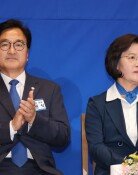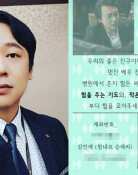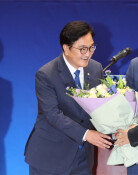Koreans Financially Burdened by Congratulatory and Condolatory Money
Koreans Financially Burdened by Congratulatory and Condolatory Money
Posted May. 29, 2008 08:59,
I spend all of the money I get from National Pension to congratulate or console other people.
Lee, a 58-year-old retired banker, quit his job in 2002 after working as a branch manager at a major bank. He spends around 2 million won including 560,000 won of pension per month. In April alone, he spent 550,000 won in congratulatory or condolatory money.
After retirement, he stopped playing golf but could not enjoy the luxury of not paying congratulatory or condolatory money since his three children would marry soon.
According to the National Statistical Office, an average Korean household with more than two family members spent 519,000 won to congratulate or console in 2007. The total amount of all Korean household spending for those purposes reached a whopping 7.6681 trillion won last year. The expense of households with more than two family members grew 18.7 percent for four years since 2003 when the government began collecting relevant data. The growth rate is much faster than the 11.6 percent consumer price growth rate over the same period.
The expenses spent to maintain social networks have rapidly grown and put a serious burden on Korean households. Many experts argue that the underlying conception should be changed.
○ 100,000 won is not too much
The Dong-A Ilbo sorted the amount of congratulatory money written on a document of a city worker under an assumed name of Kim who married in May. The analysis showed that around half of congratulators spent 50,000 won and one out of three spent 100,000 won. The 30-year-old married at a mid-tier wedding hall, not a luxurious hotel.
Lee, a 41-year-old coworker of Kim, married in February 1999. Kim and Lee shared similar social status when each of them married. Around half of the congratulators for Lees wedding paid 30,000 won.
These cases show a pattern that has emerged in the amount of money spent.
The pattern consists of three levels: lower level for acquaintances, standard level for friends and coworkers, and high level for intimate people. If you pay more than high level, it is considered an exceptionally high level.
Three facts emerged after analysis: 1) Although nine years have passed, the pattern of the three levels has not changed; 2) The share of congratulators in each level has not changed; 3) Nine years ago, the low level stood at 20,000 won, the standard level at 30,000 won and the high level at 50,000; these now stand at 30,000 won, 50,000 won and 100,000 won, respectively.
In other words, the amount at the low level increased 50 percent and that at the standard level jumped 67 percent.
Also, the amount at the high level doubled from 50,000 won to 100,000 won and the amount at the exceptionally high level also soared from more than 100,000 won to more than 200,000 won. Given that consumer prices increased 31.5 percent from February 1999 to May 2008, congratulatory money has grown two or three times faster than consumer prices.
Also, the distribution of the amount of congratulatory money shows that the share of low-level has decreased while that of high-level has increased. That means the standard level has been pressured to increase from 50,000 won to 100,000 won.
○ Disparity between congratulatory money and social change
A 61-year-old veteran who retired six years ago still has lots of people to care about. He said, Lots of people marry in spring. I sometimes visit more than 10 weddings in one week. Many veterans say they want to leave Korea to avoid the financial burden.
In the wake of the 1997 Asian financial crisis, restructuring prevailed, which, in turn, forced lots of workers to retire earlier than expected. On the other hand, life expectancy has increased. In sum, people live around 20-30 years after retirement. Thus, the aged without any fixed income have to pay congratulatory and condolatory money for a prolonged period.
In the past, Koreans helped each other by paying congratulatory and condolatory money when their neighbors married or died. The practice played the role of a social safety net. But, as Korean society has urbanized and opened, the scope of community has blurred and the principle of give-and-take has been shaken.
For example, if someone gets a new job or retires, he or she cannot get any financial help. Along with fundamental changes, people spend more for the powers-that-be and the underprivileged are forced to tolerate disadvantage.
Chung-Ang University economics professor Shin In-seok said, Paying congratulatory and condolatory money has been considered a way to send a signal, I belong to this group, or to show off congratulators power. That means the new function of building a social network has been added to the money. This is evidenced by those who attend ceremonies of unfamiliar people or just pay the money without attending wedding ceremonies and funerals.
Some people have tried to change the custom. For example, some youths get rice, instead of receiving money, to help the poor. However, there is still a long way to go.
Kim Seok-hoon, economics professor at Sungshin Womens University, said, The Korean culture in which Koreans recklessly spend congratulatory and condolatory money regardless of financial status and familiarity is the prime example of the bubble in Korean society. Social leaders should take the lead in removing the bubble to upgrade Korean society to a higher level.
jarrett@donga.com peacechaos@donga.com







